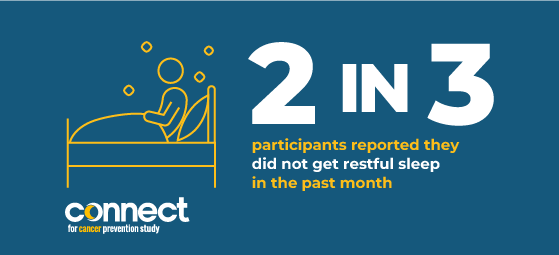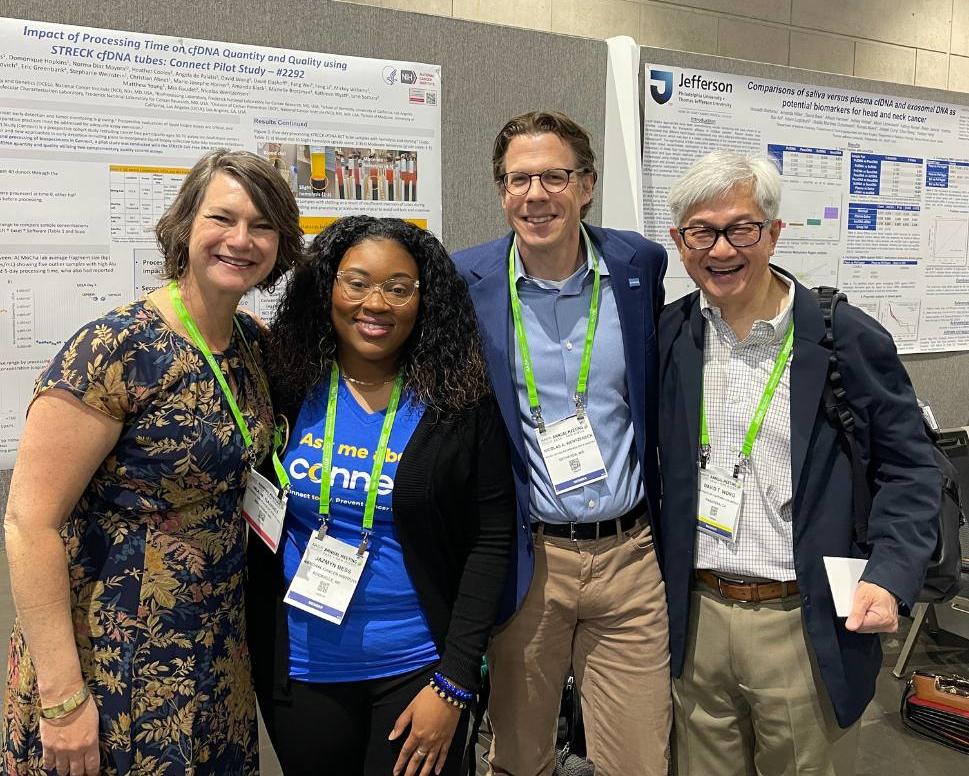Connect for Cancer Prevention: Update on the Cohort
, by Jennifer K. Loukissas, M.P.P.
The Connect for Cancer Prevention Study is a new prospective cohort seeking to enroll 200,000 adults in the United States. Connect is designed to further investigate the etiology of cancer and its outcomes, which may inform new approaches in precision prevention and early detection. We intend to update the research community as to the progress of Connect across multiple topics of interest.
Participant Recruitment
Enrollment has reached more than 40,000 participants across the nine sites that are recruiting at present. Last month, our newest partner, the Baylor Scott & White integrated healthcare system, began recruitment in Texas. We are excited to expand the demographic and geographic diversity of the catchment population of Connect. To support recruiting a diverse population, we now offer the MyConnect dashboard and key study materials, in Spanish.
Participant Retention
As Connect continues to grow, we are deeply committed to participant retention. Participants receive by email quarterly newsletters with study updates and spotlights of team members or participants and one year cohort anniversary cards, and birthday cards by mail. Earlier this year, we released the Patient-Reported Outcomes Measurement Information System (PROMIS) survey three months after enrollment. We continue to evaluate the effectiveness of digital reminders through email and SMS. Early data suggest participants who complete all baseline activities will complete the subsequent study activities.
An additional retention tool we are implementing is the return of information. The first such effort was a summary of cohort sleep data collected to-date.
Biospecimen Collection
As one of the first activities involving Connect biospecimens, genotyping of germline DNA extracted from white blood cells is planned to begin in early 2025 and continue in real-time with the remainder of recruitment. Most recently, the team evaluated various array options before landing on the Illumina Global Diversity Array (GDA) + Polygenic Risk Score (PRS) booster. The array was chosen for its comprehensive coverage of >2 million markers across diverse populations. Additionally, the booster content covers >160k important variants for PRS estimations. The extensive variant inclusion on the GDA beadchip will significantly contribute to advancing our understanding of genetic diversity and its implications in cancer risk and progression.
Planning for Microbiome Studies
Infectious agents, including bacteria, viruses, and fungi, far outnumber human cells in the body and contribute to crucial physiologic commensal functions as well as pathogenic activities. While there is much interest in the potential for the microbiome to aid in cancer prevention, or adjust the microbiome in the course of clinical management, the particulars of its involvement in cancer risk and progression are not well understood. To address the need for studies in population-representative cohorts, the baseline biospecimen collection for Connect includes a mouthwash sample. Mouthwash samples were either collected at partnering health care system or at home with a mailed collection kit. In April, Connect received the first home-collected samples and surveys from participants. This effort will pave the way for other at-home collections, including stool samples.
Connect in the Research Community
In April, several members of the study team attended the American Association for Cancer Research (AACR) Annual Meeting.
Mia M. Gaudet, Ph.D., senior scientist, organized and chaired, “Existing and Emerging Cohort Study Resources for Future Discoveries,” a workshop on the Future of Cohorts in the education program of the meeting. The session reviewed existing and emerging cohort data resources for discoveries in cancer etiology, early detection, survival, and survivorship.
Nicolas Wentzensen, M.D., Ph.D., M.P.H., Deputy Director in the Clinical Genetics Branch, and principal investigator for Connect, offered an overview of the study at the AACR Population Sciences Working Group. Dr. Gaudet also presented at ‘Meet the Experts’ sessions at the NCI booth. Jazmyn L. Bess, B.S., presented a poster describing her work on the Connect liquid biopsy pilot study, including an investigation of pre-analytical collection and processing factors that might affect the quantity and quality of cell-free DNA and RNA, a unique resource collected at baseline for future evaluation of liquid biopsy tests.
More details, including participating sites, enrollment criteria and questionnaires, can be found on the Connect Wiki.


